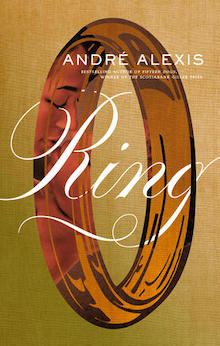
Coach House Books, 2021
When Gwen’s mother realizes her daughter is in love, she gives her a family heirloom — a ring that has been passed down from mothers to their daughters for centuries. She tells Gwen that the ring lets her choose three things to change about her beloved. Like all blessings, this may also be a curse.
At first glance, Ring seems to be a classic love triangle. Gwen meets two men. She knows Olivier is the rational choice, yet she is drawn ineluctably to Tancred. André Alexis deftly uses this familiar setup to explore larger questions of love, faith, loss, rationality, class, choice, family, fate, sacrifice, belonging, and more. He probes elegantly, without moralizing, as if to suggest that grappling with such questions is not to be avoided but rather embraced as an essential part of life.
If Alexis has a thesis, it concerns the importance and beauty of staying open to the unknown. Professor Bruno, a friend of Gwen’s family, waxes philosophical in conversation with his partner, Michael: “Speculate is all anyone can ever do about love and death and God and so on. We endlessly speculate. And it’s better that way, Michael! All the better. If these conundra were resolved once and for all, the human race would lose a crucial part of its survival mechanism: flexibility of mind.” The text is occasionally self-conscious about the limits on what we can know, but the point is the reflection.
Even the book’s title contains layered meanings that reveal themselves as the tale unfolds. Throughout, we find a series of rings. There is the magic ring that can change three things about a woman’s beloved. There are rings that traditionally accompany engagement and marriage. The story’s structure also evokes rings: the fifth chapter is titled as the first chapter continued, and the fourth, as the second chapter continued. (Despite this ring structure, the story itself is linear and easy to follow.) In the middle lies the eponymous “Ring” song, an epic poem about Aphrodite that works as a story on its own as well as an integral piece of Gwen’s narrative.
At times, the story feels like a love letter to Toronto. Alexis’ descriptions of the city showcase his intimacy with its spaces and show the city in its various moods, such as in this description of breakfast in the Bloor Street neighbourhood:
Bloor was almost back to the Bloor [Gwen] loved best: its summer self when, during the day, the street is busy and you can imagine going into By the Way for Jerusalem Eggs and sitting at the window, looking out at Brunswick, looking over at Future Bakery — outdoor tables, a Stella Artois sign, a mural that looked like aggressive blue waves staring up at their mistress, a woman carrying a basket of bread — trying to remember when the bookstore at 501 closed, when the Brunswick Hotel closed, and where some of the restaurants she’d once frequented had gone.
Alexis captures the city with a gush of prose compelled by delicate comma placement and pronouns that switch between the general (“you”) and the specific (“she”) to make the reader part of the scene. Alexis’s love for Toronto and other parts of Southern Ontario comes through clearly, and he presents the region in all its messy complexity. The characters embody the area’s diversity. Although they experience struggles with race, gender, and disability, Alexis uses a light touch. Mostly the characters are making their way as best they can in an imperfect world. Perhaps the author is suggesting that these struggles are indeed a part of life, but only one part. Art, love, poetry, travel, friendship — these things are also part of life.
Any novel necessarily engages language, but Ring goes further by employing language as a theme. Written and edited while Alexis was living in Berlin during the Covid-19 pandemic, the book’s prose whispers the sounds of Germany. These sounds appear in the author’s choice of character names, a joke about the German word “Gift” (meaning “poison”), and German phrases sprinkled throughout. Other languages — from Ancient Greek to French to Chinese — lend the text a polyvocal quality that sounds like the real world. Alexis highlights the ambiguity and ephemerality of language: “Words are not static,” one character says. And later: “Language needs each of us to discover itself.”
Although the novel grapples with serious subject matter and includes philosophical musings, it never feels weighty or overly serious. Alexis serves up delightful turns of phrase (“There was something vulnerable about the foyer, as if an art gallery had been caught putting on its stockings”) and several laugh-out-loud moments.
With this masterful literary fairy tale, Alexis has completed his five-book quincunx, less a series than a philosophical assemblage with Ring at its center. A tour de force by an accomplished writer, Ring reminds us there are still mysteries in the world that are well worth exploring.
+++
+